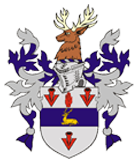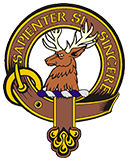Septs of Clan Davidson
Davey, Davie, Davis, Davison, Davisson, Davy, Daw, Dawson, Day, Dea, Dean, Deane, Deas, Deason, Deay, Dee, Desson, Devette, Dewis, Dey, Dhai, Dow, Dye, Dyson, Kay, Keay, Key, Keys, MacAdie, MacDade, MacDagnie, MacDagny, MacDaid, MacDavett, MacDavid, MacDavitt, MacDhai, MacKay (Moray only), McDevitt, McKeddie, Slora, Slorach., Slorie, Slory
*Note 1: For more information on the issue of who is “entitled” to wear what Tartan, see (Tartan Page Link)
**Note 2: From the book “The Davidsons, The Clan, Its history & Its people” {Clan Davidson Association (UK)} the following clarification regarding the origins of some of the septs of the Clan is quoted:
The surname Davidson itself has a surprising variety of spellings including Deavidson, Dividson, Dawidson, Davisoune, and Davyson, Daviderson, Divison & Daverson, Davison, Davis, Davies Davy, Davie, Day & Dey can in theory be derived from Davey /Davie as a Christian name.
Likewise Dyson could be derived from son of Dai, & Dawson from son of Dawi. A Davie in Ayr in 1750 was sometimes Davies and sometimes Davidson. Dawson in cursive handwriting may differ from Davison only by a dot which may or may not appear over the “I”. Some Mackintosh documents records a family of Deans in 1703 who were otherwise called Davidson.
The original Gaelic Dai in its vocative case Dhai can, because of the peculiarities of Gaelic pronounciation give rise to Kay or even Mackay…
It seems likely that Davidson in common with some other names, even some of Highland origin such as Farquharson, came into use as a surname in its English form although it may also have arisen as translation from the Gaelic.
Our early Clan Records compiled by Flora Davidson show … Day & Dey in Aberdeenshire… spelling is variable and often dependent on the whim of the scribe on a particular day, especially when the person being recorded was illiterate as most were in earlier centuries.
*** Note 3: There is much confusion about the meaning of and the use of “Mac” among the Gaelic peoples of the world. In truth, the Gaels used the “Mac” prefix simply to indicate that the person was the “son of” someone, such as in John MacDye was John, the son of Dye. This prefix can be found in many different forms including Mac, Mc, Ma, and even, M’. The most often heard myth is that the Scots always use the “Mac” form while the Irish always use the “Mc” form. This just isn’t so. The reality is that Mac, Mc, Ma, and M’ were frequently used interchangeably, depending on the whims of the person doing the documenting, what period in history we’re discussing and where in the Celtic world is being considered.

